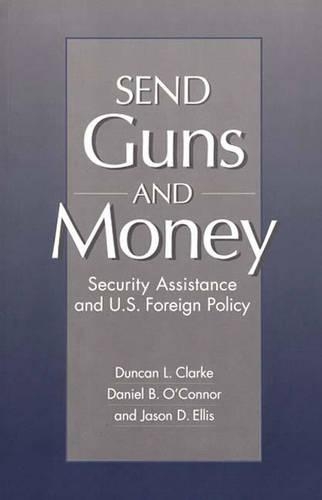
Send Guns and Money: Security Assistance and U.S. Foreign Policy
(Paperback)
Available Formats
Publishing Details
Send Guns and Money: Security Assistance and U.S. Foreign Policy
By (Author) Duncan L. Clarke
By (author) Jason D. Ellis
By (author) Daniel OConnor
Bloomsbury Publishing PLC
Praeger Publishers Inc
30th September 1997
United States
Classifications
Tertiary Education
Non Fiction
International economics
327.73
Physical Properties
Paperback
224
Description
American foreign policy since 1947 cannot be understood apart from the U.S. security assistance program. Beginning with Truman, every president has considered security assistance programs important means for furthering U.S. national interests. Security assistance has been used to support a wide variety of policies, including the Truman Doctrine and containment, the underwriting of the Camp David Accords, and the channeling of aid to the newly democratic countries of Central and Eastern Europe. American foreign policy since 1947 cannot be understood apart from the U.S. security assistance program. Beginning with Truman, every president has considered security assistance programs important means for furthering U.S. national interests. Security assistance has been used to support a wide variety of policies, including the Truman Doctrine and containment, the underwriting of the Camp David Accords, and the channeling of aid to the newly democratic countries of Central and Eastern Europe. This book provides a comprehensive treatment of the program from 1947 through fiscal year 1996. After discussing the legal foundations and components of the program, the authors provide an historical survey from 1947 through the first Clinton administration. They then detail the role of Congress, public opinion, and interest groups. Separate treatment is given to countries such as Israel, Egypt, Greece, and Turkey. The authors also suggest ideas on how the programs can be changed to mesh with American objectives and resources in the 21st century. This is a major study of interest to students, scholars, researchers, and policymakers.
Reviews
[T]his book is an excellent study of the often unacknowledged effect of these programs on both U.S. interests and global stability. Send Guns and Money provides an extremely well detailed, insiders perspective on the decision-making process in the executive and legislative branches, as well as the views that different administrations over the past fifty years held regarding the role that the programs were supposed to play in overall U.S. foreign policy....[T]he authors have provided scholars with a strong tool for understanding part of the background of U.S. foreign policy decicion making and development over the past fifty years.-NSSQ
"This book is an excellent study of the often unacknowledged effect of these programs on both U.S. interests and global stability. Send Guns and Money provides an extremely well detailed, insiders perspective on the decision-making process in the executive and legislative branches, as well as the views that different administrations over the past fifty years held regarding the role that the programs were supposed to play in overall U.S. foreign policy....The authors have provided scholars with a strong tool for understanding part of the background of U.S. foreign policy decicion making and development over the past fifty years."-NSSQ
"[T]his book is an excellent study of the often unacknowledged effect of these programs on both U.S. interests and global stability. Send Guns and Money provides an extremely well detailed, insiders perspective on the decision-making process in the executive and legislative branches, as well as the views that different administrations over the past fifty years held regarding the role that the programs were supposed to play in overall U.S. foreign policy....[T]he authors have provided scholars with a strong tool for understanding part of the background of U.S. foreign policy decicion making and development over the past fifty years."-NSSQ
Author Bio
DUNCAN L. CLARKE is Professor of International Relations at the School of International Service, American University. DANIEL O'CONNOR is affiliated with the School of International Service, American University JASON D. ELLIS is affiliated with the School of International Service, American University. The authors have published extensively on contemporary foreign affairs issues.
